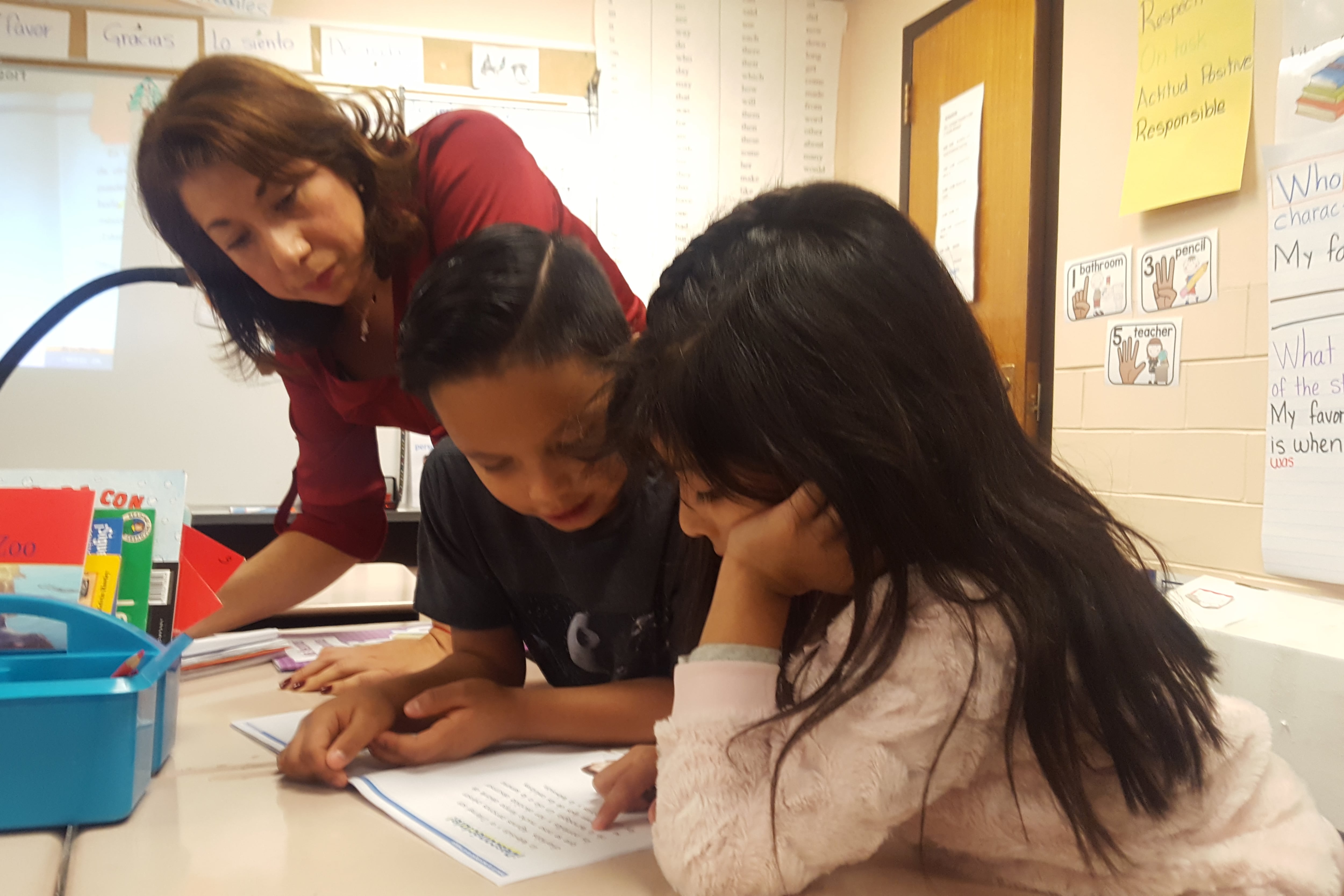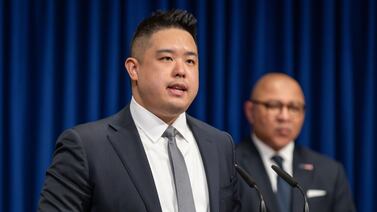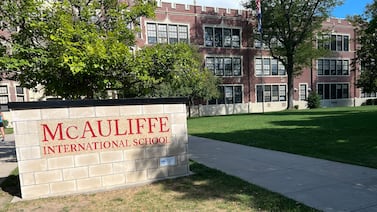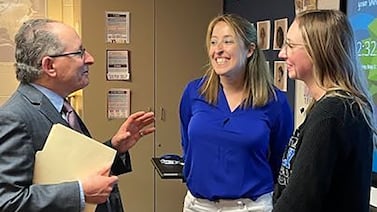As the effort to turn around student performance in the Adams 14 district enters its third year, improving how children are taught to read remains a major challenge.
Low student reading scores plummeted even lower during the pandemic. The district failed to spend a state literacy grant and even after getting a second chance, could not agree with its external managers on how to use the money. A consultant hired to improve reading instruction left abruptly in the spring, later accusing MGT of interfering and not following proven teaching methods.
Getting more students to read on grade level is key to improving achievement in the struggling Adams 14 district, the only Colorado district ordered to turn its day-to-day operations over to an external manager.
After a turbulent year, district and state officials said in interviews that Adams 14 is turning the page and has agreed on how to approach reading instruction. The district is now training teachers to use their new curriculum and has a second shot at the state grant. Plus, state officials are visiting Adams 14 schools every week to make sure things stay on track.
“They’ve done a really good reset this year,” said Rhonda Haniford, the state’s associate commissioner of school quality and support. “They’re all rowing in the same direction.”
Haniford said she is no longer concerned that Adams 14 schools might be getting mixed messages from the many outside people assisting, or that anyone is going against the science of reading, a term used to refer to a large body of research on how children learn to read.
Responding to state orders, Adams 14 contracted with MGT Consulting to manage its affairs, just as education officials began pushing to improve reading instruction across the state. However, interviews and emails obtained by Chalkbeat show that MGT staff and its hired consultants in Adams 14 didn’t always agree on best practices.
Consultant Schools Cubed left in the spring, accusing MGT of contradicting advice to schools and making it hard to work. A letter sent by Schools Cubed lawyers to district and state officials details some of the problems.
“Even though Schools Cubed was appointed by the district as the literacy partner, MGT brought in its own literacy consultants who had conflicting views with the science of reading principles followed by Schools Cubed,” the letter states. “Consequently, teachers and principals did not know what to do.”
Data shows that reading instruction has suffered. During the turmoil of the pandemic, Hispanic third-grade test scores in Adams 14 fell by half. In 2019, a little more than 20% met or exceeded reading expectations. Last spring, that percent fell to less than 10%. It was a bigger drop than the statewide average. And the number of students identified as struggling readers has gone up.
More than half of Adams 14 students are learning English as a second language. Students who become fully bilingual do better than monolingual English speakers on standardized tests, but they often score lower while they are still learning the language. And they need tailored instruction to reach their potential.
In recent years, Adams 14 has frequently changed its approach to both bilingual education and reading instruction, leading to more inconsistency for students. Even now, in its third year of external management, a churn in staffing has contributed to delays in rolling out a comprehensive plan for how to teach reading.
Adams 14’s new superintendent, Karla Loria, has praised both structured literacy, the state-approved approach, and balanced literacy, which reading experts have criticized.
“The key here is to provide a faithful implementation,” Loria said. “I’ve worked with both and both have good things,” Loria said. “There’s not one perfect program.”
MGT also has a new leader, Andre Wright, the former chief academic officer of Aurora Public Schools, a district that has also used reading instruction practices not backed by science.
Wright was not available for an interview, but MGT officials have said they don’t take sides on what they called the reading wars, the dueling approaches to teaching, and are following the science of reading.
Shelagh Burke, the Adams 14 chief academic officer, said the “state made it very clear” that Adams 14 must follow the science of reading, as all districts in the state must. And she said they are.
The curriculum that MGT helped bring in last year, Superkids Reading Program for kindergarten through second grade and Wonders in third through fifth grade, is on the state’s approved list. It was one of the achievements that MGT touted in its first two years.
But the pandemic delayed the district in training teachers on the new resources. Now at least one elementary school has requested and gotten a different curriculum and Loria said other schools have made similar requests.
Adams 14 this year has four bilingual elementary schools. Those schools are using two different resources in the early grades, one for their English classrooms and one for their bilingual classrooms. The older grades all used the same curriculum as the English classrooms.
The principal at Central Elementary wanted all classrooms in the school to use the same resource, so teachers could plan together.
But state officials are concerned that those teachers at Central who switched curriculum won’t have the same level of support from the district, since district training will be focused on resources that all the other schools use.
Loria said it’s possible the curriculum could change again.
“That will have to be looked at deeper and with more time,” Loria said. “The key here is to make sure teachers will be prepared to change the curriculum.”
Worried about the delay in progress, state officials have stepped up their guidance and monitoring, more than they have for any other struggling school or district in the state, and even embedded a state employee in Adams 14, specifically to help with literacy and English language development systems.
State officials are visiting the district at least twice a week now. In February, the state Department of Education decided to provide additional help to Adams 14 by dedicating almost half of one of their employees’ time. Alice Collins, a senior consultant for English language development in the Culturally and Linguistically Diverse office, is embedded in the district working in schools to coach district and MGT leaders in their rollout of English language development and literacy programs.
That, the state’s Haniford said, “was a very high need.”
The state also helped Adams 14 by giving it another chance at using the money from the Early Literacy Grant this year despite not having used it last year. Just recently, the district came to an agreement to have the same plan as before but with a new consultant. Amy Vanravenswaay from Growing Educational Practices is approved by the state as following the science of reading. She will visit each school once per month to observe and advise on reading, as well as offer seven days of training this year.
In addition to the consultant, MGT has at least two literacy coaches just for the elementary schools in Adams 14, as well as a literacy turnaround specialist, Angel Stobaugh, who oversees all literacy work for MGT and focuses on helping teachers.
“What I’m seeing is that they’re digging in,” Stobaugh said. “Teachers are learning about the components of the science of reading and I believe their skillfulness will increase.”
Adams 14 also now has two district leaders in charge of literacy.
The district is also getting all its K-3 teachers trained on the fundamentals of reading instruction, a state requirement. So far, 27% of district teachers have received the 45-hour training.
Still, Loria said teachers are committed and working hard. “Yes, there are challenges. I still feel very hopeful.”








